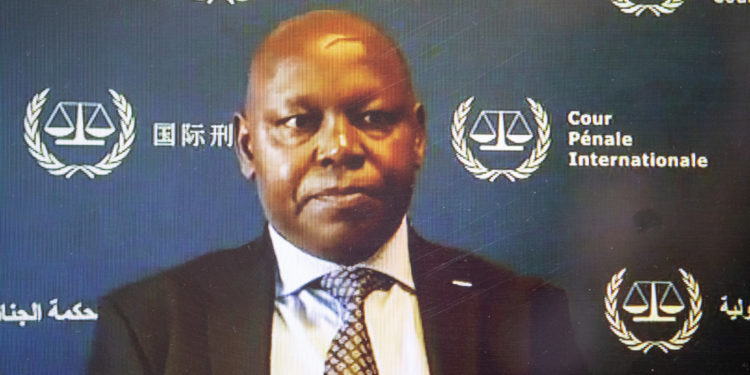By Thomas Verfuss in The Hague
From his Scheveningen prison cell Kenyan Paul Gicheru has appointed veteran American defence lawyer Michael G. Karnavas to represent him before the International Criminal Court (ICC). He did this via a phone call to the court’s registry, as the necessary written forms were not available in the detention unit.
Gicheru, a lawyer formerly based in Kenya is suspected of offences against the administration of justice consisting in corruptly influencing witnesses of the ICC.
His surrender to the authorities of The Netherlands on November 2, 2020, came as a surprise to many in Kenya. The ICC had issued an arrest warrant for him and another Kenyan, Philip Kipkoech Bett, in 2015.
The court accused the two of leading efforts to tamper with witnesses in the original case against Kenya’s Deputy President William Ruto and radio presenter Joshua Sang.
This was one of two cases that followed the country’s post-election violence in 2007/2008. The case ended in a mistrial in 2016, with the ICC bench, in a majority decision, declining to acquit both Ruto and Sang. Instead, the judges only vacated the charges.
A third Kenyan, journalist Walter Barasa, is still wanted by the ICC in connection with witness tampering in the case. He lost an appeal against extradition in August 2019. His indictment was issued in August 2013.
Asked by JFJ about the reasons for Gicheru’s sudden surprise surrender, Karnavas says: “I am as clueless as you are.”
Karnavas is a US lawyer of Greek origin with decades of experience in international and internationalised courts and tribunals, like the UN’s International Criminal Tribunal for the former Yugoslavia (ICTY) and the Extraordinary Chambers in the Courts of Cambodia (ECCC).
Karnavas is known as a tough guy: hard-hitting with the prosecution (American style), sometimes too demanding with his own client if he thinks it is necessary in the interests of justice, many times a headache for the judges, a few times on collision course with his fellow counsel in the respective professional associations, and constantly but constructively challenging the system of international (criminal) justice as a whole in his blog.
Karnavas represented Colonel Vidoje Blagojevic before the ICTY since 2001. The Serb officer served in the army of Republika Srpska, the breakaway Serb entity within Bosnia that was engaged in a bloody war with the Muslim-dominated government in the capital Sarajevo from 1992 until 1995. The conflict claimed more than 100,000 lives, the highest death toll in Europe since World War II. Blagojevic was charged with complicity in the genocide of thousands of Muslim men and boys after the fall of the enclave Srebrenica on July 11, 1995. It was the only genocide in Europe after the murder of millions of Jews in WW II. The legal qualification genocide has been given to the Srebrenica tragedy by two UN courts, the ICTY and the International Court of Justice (ICJ), also in The Hague. After a vigorous defence by Karnavas, Blagojevic was acquitted of the genocide charge. He was still convicted of war crimes and crimes against humanity. The ICTY appeals chamber reduced his initial 18 years sentence to 15 years. Blagojevic served the remainder of his jail term in Norway and was granted early release by the ICTY president in 2012.
Karnavas was also counsel for a high representative of another breakaway entity in the multi-ethnic Bosnia-Hercegovina: he defended Prime Minister Jadranko Prlic of Herceg-Bosna, the ministate within Bosnia that the Croat minority formed during the 1992-95 war. Prlic’s voluntary surrender to the ICTY in 2004 led to one of the longest lasting and complex cases before the UN court: it was not until after almost nine years that he was sentenced to 25 years for war crimes, punishment affirmed in 2017 by the appeals chamber. While judge Carmel Agius read out that judgement, Prlic’ co-defendant Slobodan Praljak infamously committed suicide before TV cameras and thus the eyes of the world by drinking a liquid containing cyanide. It was the last ICTY appeals chamber judgement, a macabre conclusion of its work after 14 years.
Karnavas also has international court experience with the legal issues at hand in the Gicheru case. In 2010/11 he defended the ethnic Albanian Shefqet Kabashi who was charged with contempt of court in the trial against former Prime Minister Ramush Haradinaj of Kosovo, a breakaway entity in Serbia. Kabashi ended up being sentenced to two months imprisonment for contumaciously failing to answer questions as a witness during the trial against his former master.
In Phnom Penh Karnavas represented leng Sary, former deputy prime minister of Cambodia during the terror regime of the Maoist Khmer Rouge that claimed millions of lives from 1975-1979. The trial ended in 2013 with the death of the 87-year-old leng Sary before the ECCC judges could render their judgement.
Interestingly enough, Karnavas already appeared before the ICC, in the Ruto case, before he was hired by Gicheru. From January 12-29, 2015 he was duty counsel for a protected witness of the prosecution. The court generally appoints such duty counsel to assist witnesses to protect them against self-incrimination.
According to the ICC, the next stage in the Gicheru case will be the confirmation of charges, expected to be conducted in writing. The prosecution is to file its document containing the charges by February 12, 2021. The defence has up to February 26, 2021 to file a list of evidence. The parties shall then file written submissions by March 15, with the replies expected by the end of that month. The purpose of the confirmation of charges is to determine whether or not there is sufficient evidence to conduct a trial.
Court filing:
https://www.icc-cpi.int/CourtRecords/CR2020_06389.PDF
Karnavas’ blog:






